By Leen Randell
Updated: Jul 04, 2024
10 Best Herbal Decoctions For Jaundice
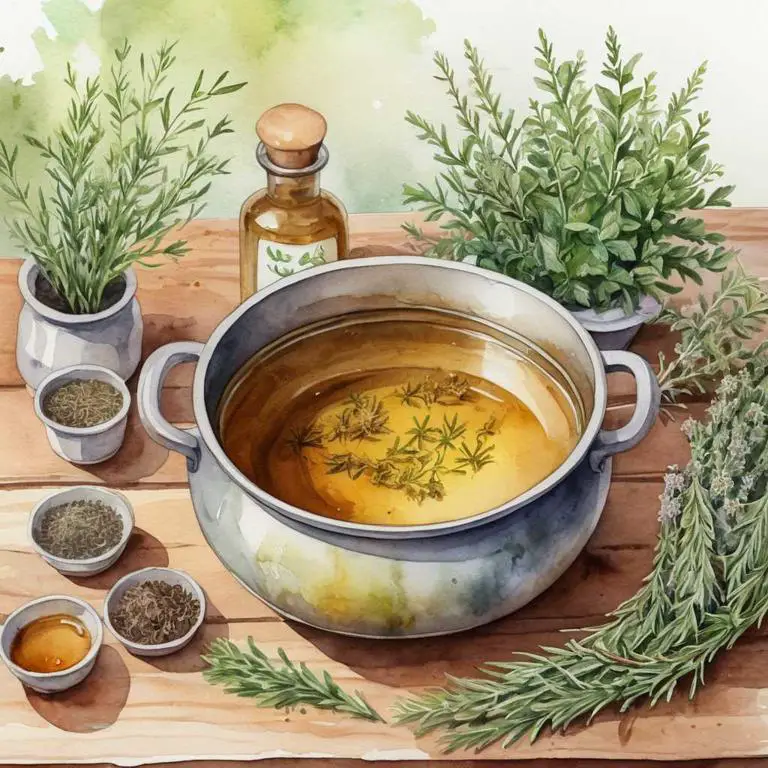
Herbal decoctions for jaundice are concentrated liquid extracts made from a combination of herbs, carefully selected to address the underlying causes and symptoms of this liver disorder.
These decoctions help by stimulating digestion, reducing inflammation, and promoting the removal of toxins from the body. Examples of herbal decoctions that have been used to treat jaundice include Turmeric-Ginger blend, which improves liver function and reduces bilirubin levels, and Milk Thistle-Neem combination, which protects the liver from damage and promotes its natural detoxification processes.
By using these herbal decoctions, individuals with jaundice can experience relief from symptoms such as yellowing of the skin and eyes, fatigue, and abdominal pain, improving their overall quality of life.
The following article describes in detail the most important decoctions for jaundice, including medicinal properties, parts of herbs to use, and recipes for preparations.
- 1. Silybum marianum
- 2. Taraxacum officinale
- 3. Glycyrrhiza glabra
- 4. Curcuma longa
- 5. Althaea officinalis
- 6. Urtica dioica
- 7. Ginkgo biloba
- 8. Rosa rubiginosa
- 9. Matricaria chamomilla
- 10. Vaccinium myrtillus
- What is the best combination of herbal decoctions to use for jaundice?
- What ailments similar to jaundice are treated with herbal decoctions?
1. Silybum marianum
Milk thistle decoctions helps with jaundice because of its remarkable ability to support liver function.
The decoction's active compounds, silymarin and silidianin, have been shown to protect liver cells from damage caused by free radicals and toxins, allowing the liver to regenerate and heal more efficiently. This, in turn, can help reduce bilirubin levels in the blood, alleviating symptoms of jaundice such as yellowing of the skin and eyes.
By promoting healthy liver function, milk thistle decoctions can provide effective relief from this condition.
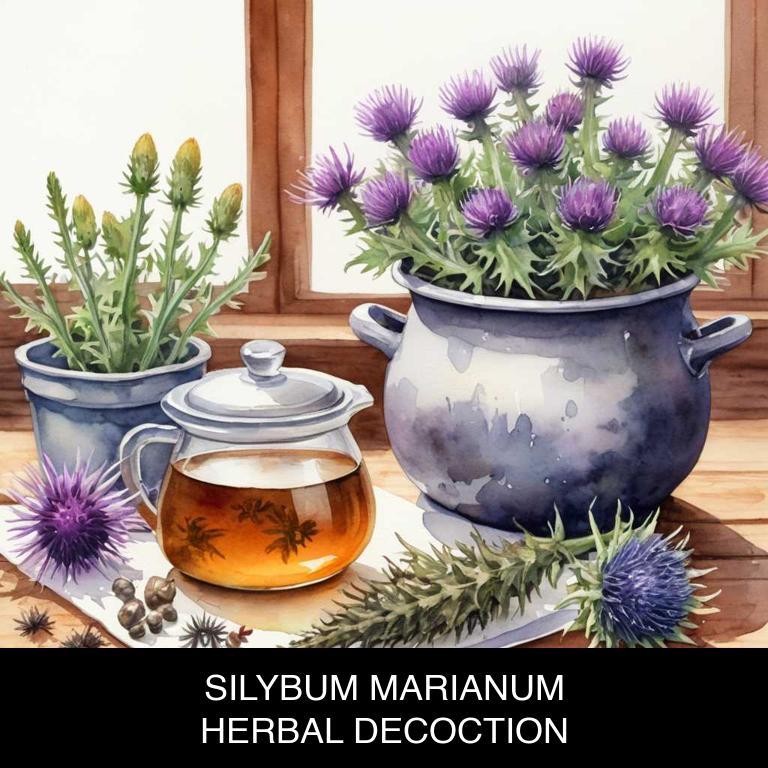
Medicinal Constituents
The list below shows the primary medicinal constituents in Silybum marianum decoctions that help with jaundice.
- Silymarin: Silymarin is a flavonoid complex that helps with jaundice by inhibiting the uptake of bilirubin by liver cells and promoting its excretion into the bile, thus reducing bilirubin levels in the blood.
- Silibinin: Silibinin, a major component of silymarin, has antioxidant properties that help protect the liver from oxidative stress caused by jaundice, promoting liver regeneration and improving liver function.
- Isosilybin: Isosilybin, another component of silymarin, has anti-inflammatory properties that help reduce liver inflammation caused by jaundice, thereby improving liver health and reducing bilirubin levels.
Parts Used
The list below shows the primary parts of milk thistle used to make decoctions for jaundice.
- Seeds: They are the most commonly used part due to their high silymarin content, which helps in treating liver diseases and jaundice.
- Leaves: Leaves are used due to their ability to promote liver health and reduce bilirubin levels.
- Flowers: Flowers are used to treat jaundice due to their antioxidant properties and their ability to improve liver function.
Quick Recipe
The following recipe gives a procedure to make a basic milk thistle for jaundice.
- Harvest 20-30 grams of fresh silybum marianum plant material for decoction preparation.
- Crush the harvested silybum marianum plant material into small pieces using a mortar and pestle.
- Combine the crushed silybum marianum plant material with 500 milliliters of water in a saucepan.
- Boil the mixture for 10-15 minutes over medium heat while occasionally stirring the liquid.
- Strain the decoction through a cheesecloth or a fine-mesh sieve into a clean container.
2. Taraxacum officinale
Dandelion decoctions helps with jaundice because it acts as a natural cholagogue, stimulating the release of bile from the liver and gallbladder.
The antioxidants and flavonoids present in dandelion help to reduce inflammation and oxidative stress in the liver, promoting healthy liver function. Additionally, dandelion's diuretic properties help to increase urine production, which can aid in removing bilirubin from the body, reducing jaundice symptoms.
This natural approach has been used for centuries to support liver health and alleviate jaundice symptoms.

Medicinal Constituents
The list below shows the primary medicinal constituents in Taraxacum officinale decoctions that help with jaundice.
- Flavonoids: Flavonoids, such as luteolin and quercetin, in Taraxacum officinale decoctions may help with jaundice by reducing inflammation and oxidative stress in the liver, thus promoting liver health and function.
- Alkaloids: Alkaloids, including taraxasterol and taraxasterol acetate, present in Taraxacum officinale decoctions, may aid in jaundice relief by stimulating liver function and bile production, thereby facilitating the removal of bilirubin from the body.
- Phenolic acids: Phenolic acids, such as caffeic acid and ferulic acid, found in Taraxacum officinale decoctions, may help alleviate jaundice symptoms by enhancing liver enzyme activity, improving bile flow, and exhibiting antioxidant properties to protect the liver from damage.
Parts Used
The list below shows the primary parts of dandelion used to make decoctions for jaundice.
- Roots: They are used due to their high content of inulin, which is believed to help break down bilirubin in the liver and alleviate jaundice symptoms.
- Leaves: The leaves of Taraxacum officinale are used because they contain flavonoids and other compounds that are thought to have anti-inflammatory and antioxidant properties, which may help reduce liver inflammation associated with jaundice.
- Flowers: Taraxacum officinale flowers are used for their potential ability to stimulate liver function and promote the excretion of bilirubin, which may help alleviate jaundice symptoms.
Quick Recipe
The following recipe gives a procedure to make a basic dandelion for jaundice.
- Gather 20-40 taraxacum officinale roots and clean them thoroughly under cold running water for 2 minutes.
- Chop the roots into small pieces and soak them in 2 liters of water for 30 minutes.
- Boil the soaked root mixture in a large pot over high heat for 10 minutes.
- Reduce heat to low and simmer the decoction for 30 minutes.
- Strain the decoction through a cheesecloth or a fine-mesh sieve into a clean container.
3. Glycyrrhiza glabra
Licorice decoctions helps with jaundice because of its unique composition, which includes compounds that have been traditionally used to stimulate liver function and improve bile flow.
The decoction's saponin content has been shown to help reduce bilirubin levels in the blood, thereby alleviating yellowing of the skin and eyes characteristic of jaundice.
Additionally, licorice's anti-inflammatory properties may help soothe irritated tissues and promote overall liver health, making it a natural adjunct therapy for managing jaundice symptoms.

Medicinal Constituents
The list below shows the primary medicinal constituents in Glycyrrhiza glabra decoctions that help with jaundice.
- Glycyrrhizin: Glycyrrhizin is a triterpenoid saponin that helps to reduce liver inflammation and improve liver function, thereby alleviating jaundice symptoms.
- Isoglycyrrhizin: Isoglycyrrhizin, a glycyrrhizin isomer, exhibits anti-inflammatory and antioxidant properties, which help to protect the liver from oxidative damage and promote its recovery from jaundice.
- Licoricidin: Licoricidin, a flavonoid glycoside, has been shown to have hepatoprotective effects by reducing liver damage and promoting the regeneration of liver cells, thus helping to resolve jaundice.
Parts Used
The list below shows the primary parts of licorice used to make decoctions for jaundice.
- Roots: The roots are commonly used due to their high concentration of glycyrrhizin, a compound known to have hepatoprotective properties that help alleviate jaundice symptoms.
- Leaves: Leaves are sometimes used in decoctions for jaundice due to their mild bitter and astringent properties, which are believed to support liver function and promote the removal of toxins.
Quick Recipe
The following recipe gives a procedure to make a basic licorice for jaundice.
- Harvest 50-100 grams of glycyrrhiza glabra roots in late summer or early fall.
- Clean the roots thoroughly with water to remove dirt and debris.
- Cut the roots into small pieces and dry them in the shade for 2-3 weeks.
- Combine 5-10 grams of dried glycyrrhiza glabra roots with 1 liter of water in a saucepan.
- Boil the mixture for 5-10 minutes and then let it steep for 10-15 minutes.
4. Curcuma longa
Turmeric decoctions helps with jaundice because of its potent antioxidant and anti-inflammatory properties.
The curcumin present in turmeric has been shown to reduce bilirubin levels, a key indicator of jaundice. Additionally, the decoction's ability to stimulate liver function and improve bile flow can help alleviate symptoms such as yellowing of the skin and eyes.
By promoting healthy digestion and reducing inflammation, herbal turmeric decoctions may also aid in the elimination of toxins, making it a natural and effective treatment for jaundice.
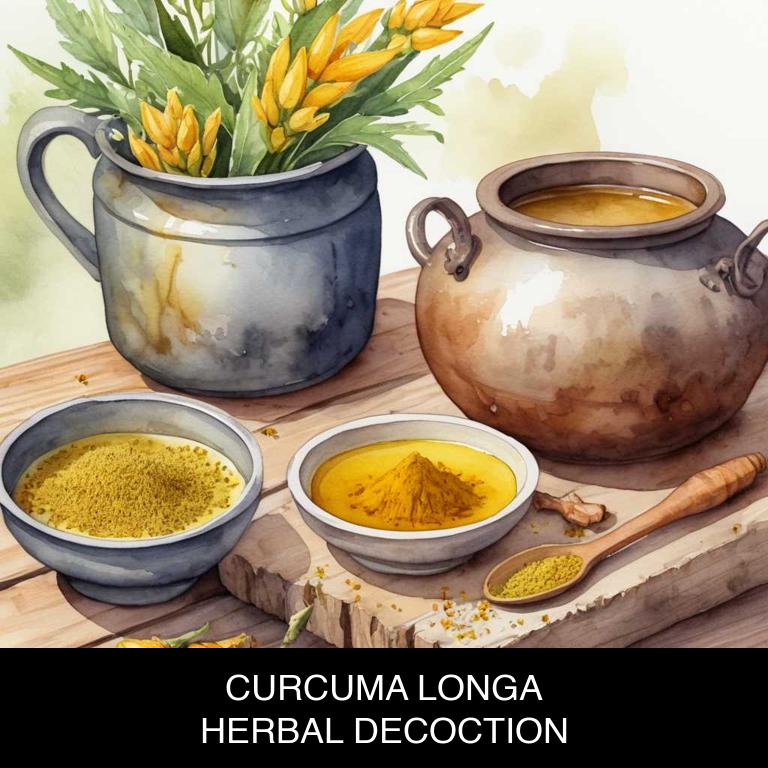
Medicinal Constituents
The list below shows the primary medicinal constituents in Curcuma longa decoctions that help with jaundice.
- Curcumin: Curcumin, a polyphenolic compound, helps alleviate jaundice by reducing liver inflammation and improving liver function, which in turn promotes the clearance of bilirubin from the body.
- Demethoxycurcumin: DMC, another polyphenolic compound, helps combat jaundice by inhibiting the production of pro-inflammatory enzymes and cytokines, which are involved in liver damage and bile duct obstruction.
- Volitin a: Volitin A, a sesquiterpene, helps mitigate jaundice by exerting anti-inflammatory and antioxidant effects on liver cells, thereby protecting them from oxidative stress and promoting the restoration of normal liver function.
Parts Used
The list below shows the primary parts of turmeric used to make decoctions for jaundice.
- Rhyzomes: Used as it is rich in curcumin, a natural compound with anti-inflammatory and antioxidant properties that help in reducing liver inflammation and promoting bile flow.
- Roots: Utilized due to their ability to stimulate liver function and improve digestion, which in turn helps in treating jaundice.
- Stems: Employed for their potential to reduce liver inflammation and promote the removal of toxins from the body, contributing to jaundice treatment.
Quick Recipe
The following recipe gives a procedure to make a basic turmeric for jaundice.
- Weigh out 1-2 teaspoons of dried curcuma longa root and transfer it to a clean glass container.
- Add 2 cups of boiling water to the container with the dried curcuma longa root.
- Steep the mixture for 5-7 minutes to allow the active compounds to infuse into the water.
- Strain the mixture through a fine-mesh sieve or cheesecloth into a clean glass container.
- Discard the solids and use the decoction immediately or store it in the refrigerator for up to 24 hours.
5. Althaea officinalis
Marshmallow decoctions helps with jaundice because they have anti-inflammatory properties that reduce liver inflammation, which is a primary cause of this condition.
The saponins present in marshmallows also help to emulsify bilirubin, allowing it to be excreted more effectively from the body. Additionally, marshmallow decoctions have been shown to improve bile flow and reduce conjugation defects, further contributing to their ability to alleviate symptoms of jaundice.
This natural remedy can provide relief for individuals suffering from this condition.
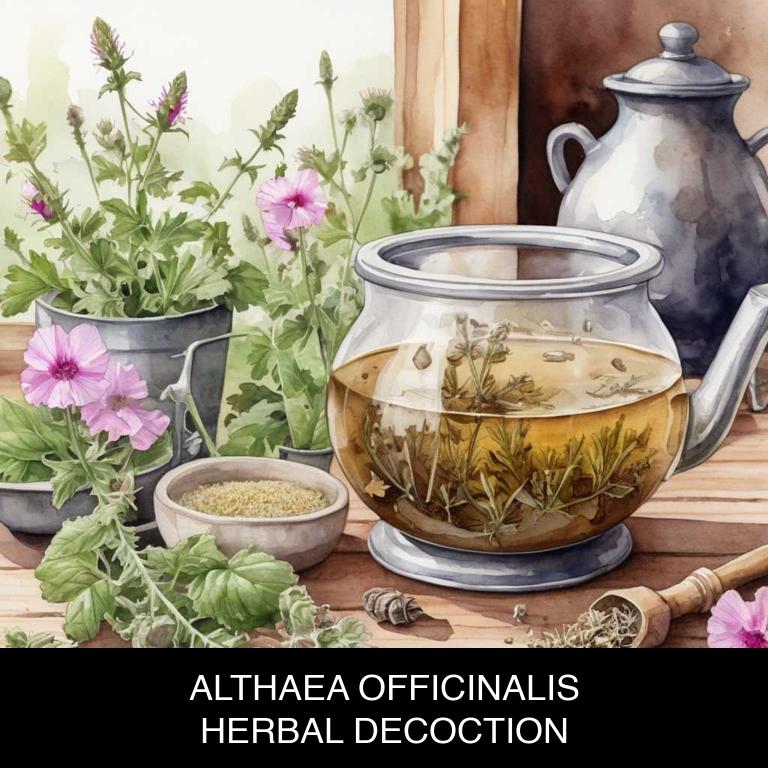
Medicinal Constituents
The list below shows the primary medicinal constituents in Althaea officinalis decoctions that help with jaundice.
- Mucilages: Mucilages help soothe and protect the mucous membranes in the digestive tract, reducing inflammation and discomfort associated with jaundice.
- Triterpene saponins: Triterpene saponins have anti-inflammatory properties, which can help alleviate liver inflammation and promote the removal of bilirubin, a pigment responsible for jaundice.
- Iridoid glycosides: Iridoid glycosides have been shown to have hepatoprotective effects, protecting the liver from damage and promoting its natural cleansing processes, which can help alleviate jaundice symptoms.
Parts Used
The list below shows the primary parts of marshmallow used to make decoctions for jaundice.
- Roots: Roots: The part of Althaea officinalis used to make decoctions for jaundice due to its rich content of mucilages and glycosides with potential anti-inflammatory properties.
- Leaves: Leaves: The part of Althaea officinalis used to make decoctions for jaundice as it contains flavonoids and phenolic acids which have antioxidant and anti-inflammatory effects.
- Barks: Barks: The part of Althaea officinalis used to make decoctions for jaundice due to its tannins and flavonoids that exhibit anti-inflammatory and antioxidant properties.
Quick Recipe
The following recipe gives a procedure to make a basic marshmallow for jaundice.
- Harvest 20-30 grams of dried root of althaea officinalis from a trusted supplier or grow your own.
- Rinse the root material in a fine mesh strainer under cold running water for 2 minutes.
- Combine the rinsed root with 2 cups of water in a medium saucepan and bring to a boil.
- Reduce the heat to a simmer and let the decoction steep for 5-10 minutes or 20-30 minutes.
- Strain the decoction through a cheesecloth or a coffee filter into a clean container and discard the solids.
6. Urtica dioica
Stinging nettle decoctions helps with jaundice because of its unique combination of properties.
The decoction's high content of antioxidants, vitamins A and K, and chlorophyll help to detoxify and purify the blood, reducing bilirubin levels in the bloodstream. Additionally, the anti-inflammatory compounds in stinging nettle soothe and calm the liver, allowing it to function more efficiently.
This results in a reduction of jaundice symptoms, such as yellowing of the skin and eyes, and promotes overall liver health and function.
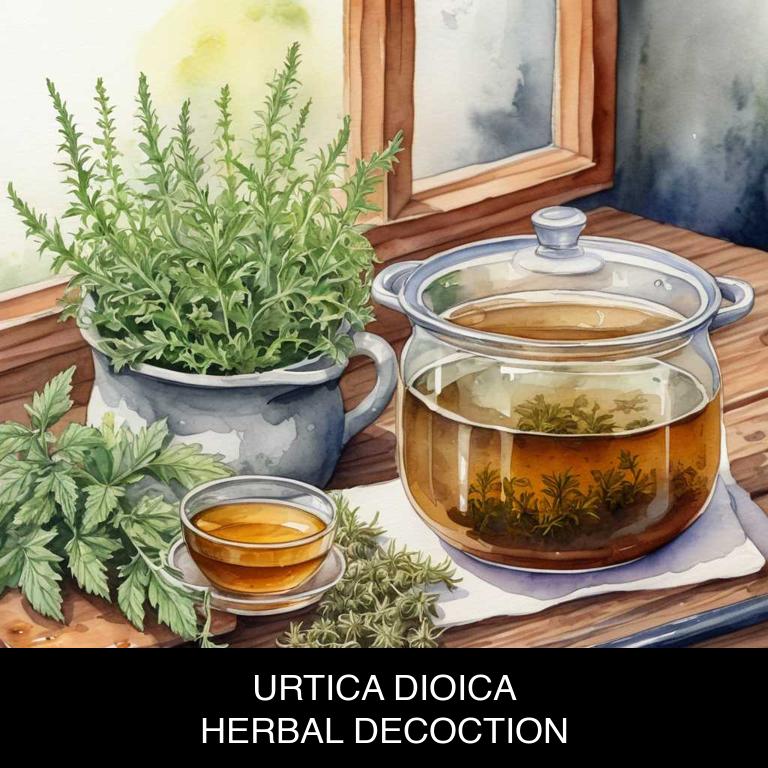
Medicinal Constituents
The list below shows the primary medicinal constituents in Urtica dioica decoctions that help with jaundice.
- Triterpenoids: Triterpenoids, such as ursolic acid, have anti-inflammatory and antioxidant properties that may help alleviate liver inflammation and oxidative stress associated with jaundice.
- Phenolic acids: Phenolic acids, such as caffeic acid, have been shown to exhibit antioxidant and hepatoprotective effects, which can help protect the liver and improve liver function in cases of jaundice.
- Flavonoids: Flavonoids, including quercetin and kaempferol, have anti-inflammatory and antioxidant properties that may help reduce liver inflammation and oxidative stress, and may also have a direct hepatoprotective effect to help improve liver function in cases of jaundice.
Parts Used
The list below shows the primary parts of stinging nettle used to make decoctions for jaundice.
- Leaves: Rich in anthraquinones, which have a laxative effect and help remove bilirubin from the body.
- Roots: Contain iridoid glycosides, which may help stimulate liver function and improve bile flow.
- Stems: Also contain anthraquinones and other compounds that may help reduce liver inflammation and improve bile production.
Quick Recipe
The following recipe gives a procedure to make a basic stinging nettle for jaundice.
- Gather 1-2 tablespoons of fresh urtica dioica leaves and stems for every 8 ounces of water.
- Clean the gathered urtica dioica thoroughly to remove any dirt and debris.
- Combine 1-2 tablespoons of fresh urtica dioica leaves and stems with 8 ounces of water in a saucepan.
- Bring the urtica dioica mixture to a boil and then reduce the heat to a simmer for 5-10 minutes.
- Strain the urtica dioica decoction through a cheesecloth or a fine-mesh sieve into a clean container.
7. Ginkgo biloba
Maidenhair tree decoctions helps with jaundice because it contains saponins, which have a profound impact on the liver's ability to function properly.
The decoction has been shown to stimulate the liver and improve its capacity for detoxification, thereby reducing bilirubin levels in the blood and alleviating symptoms of jaundice.
Additionally, the antioxidant properties of maidenhair tree decoctions help to protect the liver from further damage and inflammation, promoting overall recovery from this condition.
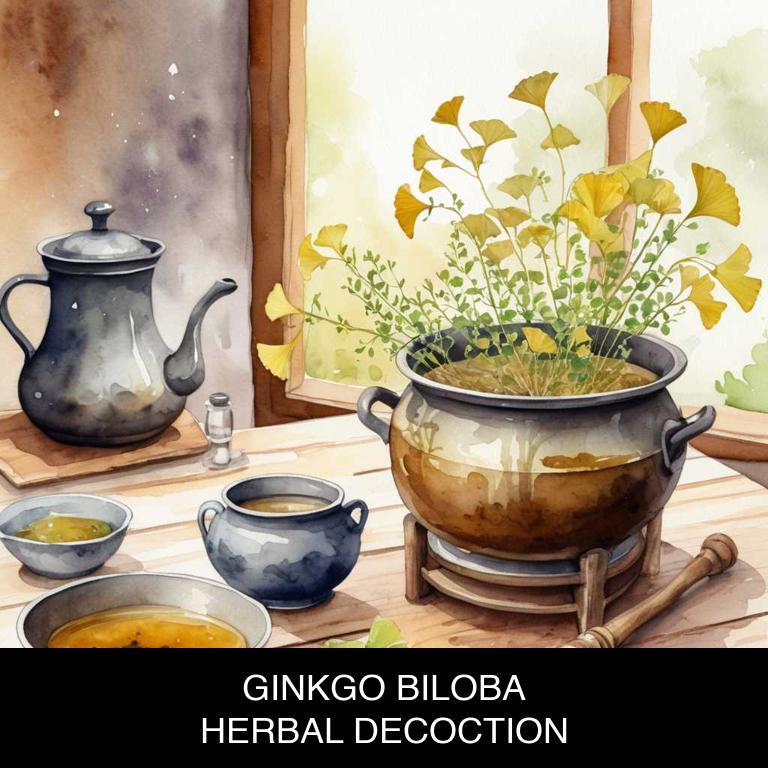
Medicinal Constituents
The list below shows the primary medicinal constituents in Ginkgo biloba decoctions that help with jaundice.
- Flavonoids: These help with jaundice by protecting liver cells from damage and promoting the removal of bilirubin, a yellow pigment responsible for jaundice.
- Terpenoids: These help with jaundice by inhibiting the breakdown of bilirubin and reducing its reabsorption, thus allowing it to be excreted from the body.
- Bilobalide: This helps with jaundice by reducing liver inflammation and promoting the regeneration of liver cells, which in turn aids in the removal of bilirubin.
Parts Used
The list below shows the primary parts of maidenhair tree used to make decoctions for jaundice.
- Leaves: They are the most commonly used part due to their high concentration of flavonoids and terpenoids, which are believed to have hepatoprotective properties.
- Seeds: They are rich in bilobalide, a compound that may help reduce liver inflammation and improve liver function.
- Barks: They contain ginkgolides, which are thought to have antioxidant and anti-inflammatory effects that can aid in treating jaundice.
Quick Recipe
The following recipe gives a procedure to make a basic maidenhair tree for jaundice.
- Weigh out 10-30 grams of dried ginkgo biloba leaves for every 250 milliliters of water.
- Combine the ginkgo biloba leaves with 250 milliliters of water in a saucepan.
- Bring the mixture to a boil over high heat then reduce the heat to low.
- Simmer the decoction for 30-60 minutes or until the liquid is reduced by half.
- Strain the decoction through a cheesecloth or fine-mesh sieve into a clean container.
8. Rosa rubiginosa
Sweet briar decoctions helps with jaundice because it is a natural remedy that has been used for centuries to treat liver and gallbladder issues.
The herb, also known as Rosa rubiginosa, contains anthocyanins and flavonoids which have potent antioxidant and anti-inflammatory properties.
These compounds help to reduce the levels of bilirubin in the blood, alleviating symptoms such as yellowing of the skin and eyes, and promoting overall liver health.
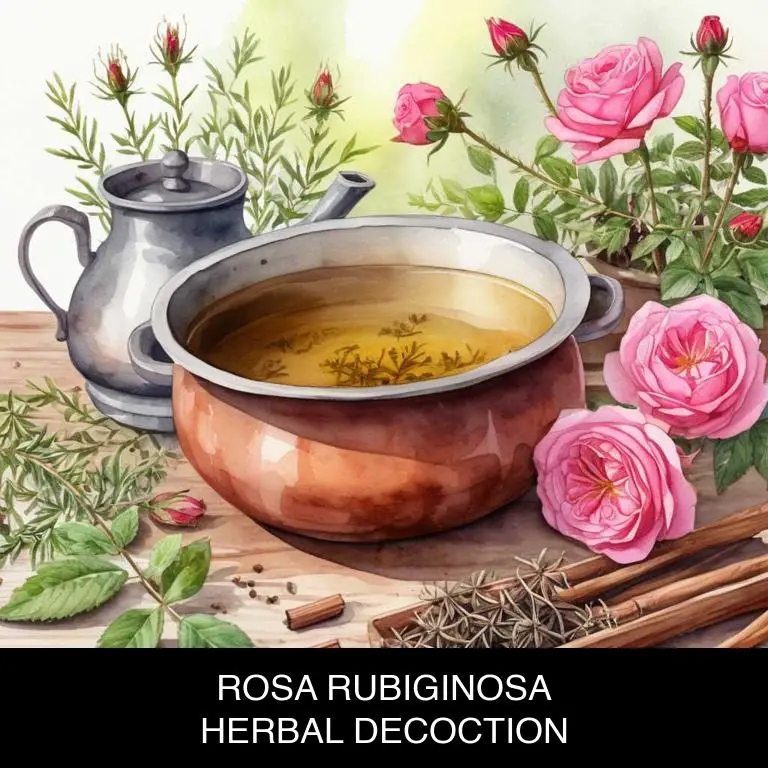
Medicinal Constituents
The list below shows the primary medicinal constituents in Rosa rubiginosa decoctions that help with jaundice.
- Flavonoids: These compounds have antioxidant and anti-inflammatory properties, which help reduce liver inflammation and promote the removal of bile pigments responsible for jaundice.
- Tannins: Tannins in Rosa rubiginosa decoctions have astringent properties, which help reduce liver congestion and promote the flow of bile, thus alleviating jaundice symptoms.
- Rosmarinic acid: This phenolic compound has antioxidant and anti-inflammatory properties, which help protect the liver from oxidative damage and promote its function, thus reducing jaundice severity.
Parts Used
The list below shows the primary parts of sweet briar used to make decoctions for jaundice.
- Roots: They are used due to their purported ability to aid in the elimination of toxins from the body.
- Leaves: They are used due to their reported ability to improve liver function and reduce bilirubin levels.
- Barks: They are used due to their potential to stimulate liver regeneration and improve overall digestive health.
Quick Recipe
The following recipe gives a procedure to make a basic sweet briar for jaundice.
- Harvest 10g of rosa rubiginosa flowers and leaves in the morning after the dew has dried.
- Wash the harvested plant material gently with cold water to remove dirt and debris.
- Chop the plant material finely and steep 5g in 250ml of boiling water for 5-10 minutes.
- Strain the decoction using cheesecloth or a coffee filter to remove solids from the liquid.
- Store the filtered decoction in a glass container in the refrigerator for up to 24 hours.
9. Matricaria chamomilla
Chamomile decoctions helps with jaundice because of its anti-inflammatory and antioxidant properties, which soothe and calm the liver and gallbladder.
The flavonoids present in chamomile help to reduce inflammation and improve bile flow, thereby reducing bilirubin levels in the blood.
Additionally, chamomile's calming effects on the digestive system can help alleviate nausea and vomiting associated with jaundice, promoting a sense of comfort and relaxation for the patient.
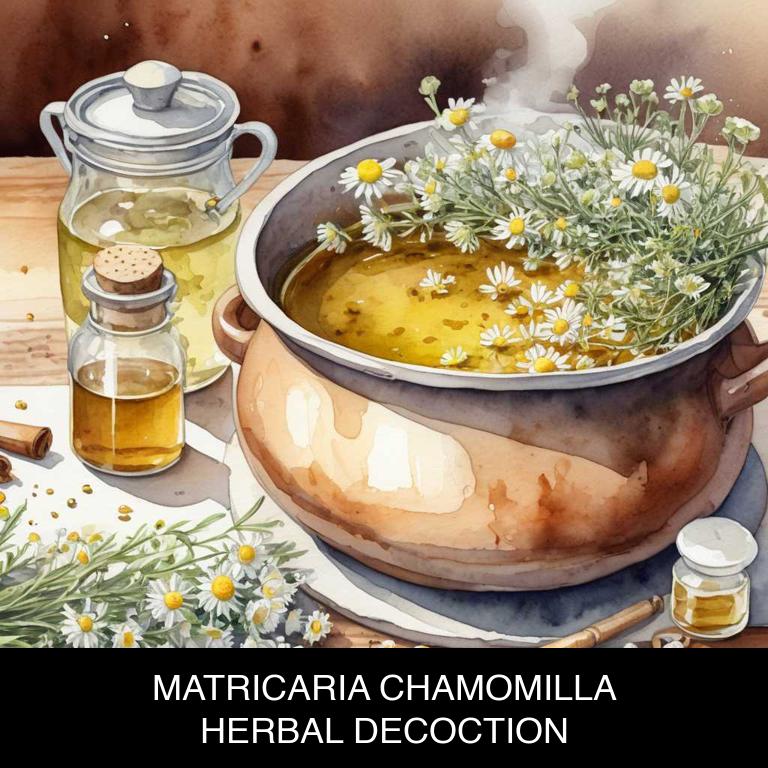
Medicinal Constituents
The list below shows the primary medicinal constituents in Matricaria chamomilla decoctions that help with jaundice.
- Apigenin: This flavonoid helps with jaundice by reducing liver inflammation and improving liver function, which can help alleviate jaundice symptoms.
- Chamazulene: This sesquiterpene lactone has anti-inflammatory properties that can help soothe liver inflammation, reducing the severity of jaundice.
- Luteolin: This flavonoid has antioxidant and anti-inflammatory properties that can help protect the liver from damage, promote liver regeneration, and alleviate jaundice symptoms.
Parts Used
The list below shows the primary parts of chamomile used to make decoctions for jaundice.
- Flowers: They are rich in apigenin, a flavonoid that has anti-inflammatory and antioxidant properties, which may help alleviate symptoms of jaundice.
- Leaves: The leaves of Matricaria chamomilla contain flavonoids and terpenoids that have been traditionally used to treat various liver and digestive issues, including jaundice.
- Roots: The roots of the plant have been used in herbal medicine to treat liver and gallbladder issues, which may be beneficial in cases of jaundice.
Quick Recipe
The following recipe gives a procedure to make a basic chamomile for jaundice.
- Harvest 30-60 grams of dried flowers or 100-150 grams of fresh flowers from the plant.
- Weigh and combine the harvested flowers with 250-500 milliliters of cold water in a pot.
- Heat the mixture over low heat for 5-10 minutes or bring to a boil then reduce heat.
- Strain the decoction through a cheesecloth or a fine mesh into a separate container.
- Allow the decoction to cool completely before storing it in a sealed container in the refrigerator.
10. Vaccinium myrtillus
Blueberry decoctions helps with jaundice because of its unique combination of anthocyanins, flavonoids, and phenolic acids.
These compounds have been shown to have potent antioxidant and anti-inflammatory properties that help to reduce the levels of bilirubin in the blood. Bilirubin is a yellow pigment that accumulates in the blood due to liver damage, causing jaundice.
The decoction's antioxidants help to neutralize free radicals that contribute to liver damage, while its flavonoids improve liver function and promote detoxification.
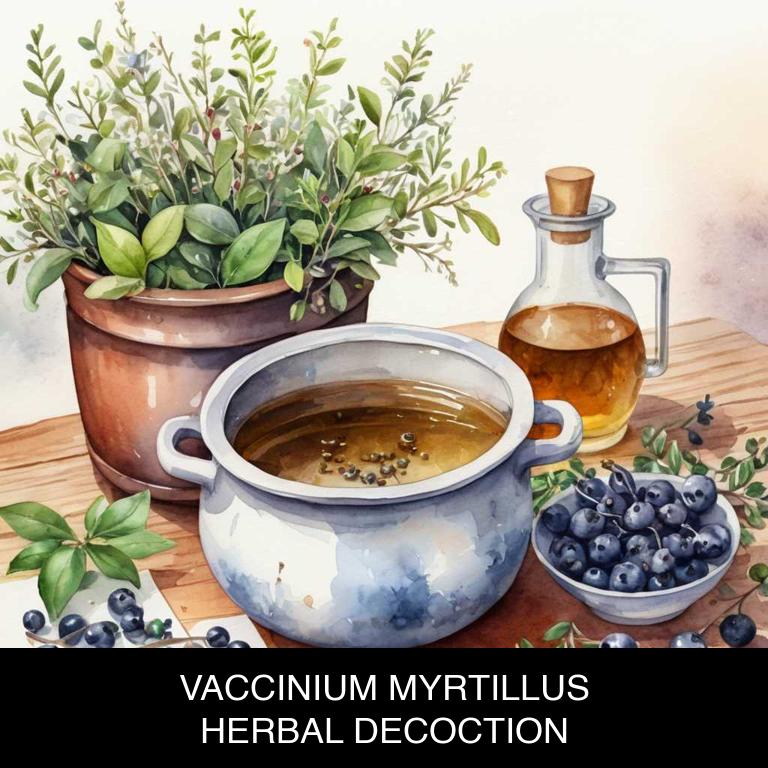
Medicinal Constituents
The list below shows the primary medicinal constituents in Vaccinium myrtillus decoctions that help with jaundice.
- Anthocyanins: These powerful antioxidants help reduce oxidative stress and inflammation in the liver, which can contribute to jaundice.
- Quercetin: This flavonoid has anti-inflammatory properties that may help reduce liver inflammation and improve liver function, alleviating jaundice symptoms.
- Delphinidin: This anthocyanin has been shown to have hepatoprotective effects, which can help protect the liver from damage and promote the removal of bilirubin, a key factor in jaundice.
Parts Used
The list below shows the primary parts of blueberry used to make decoctions for jaundice.
- Leaves: Rich in anthocyanins and other antioxidants which help counteract liver damage and promote liver health.
- Fruits: Contain anthocyanins and other compounds that help reduce liver inflammation and promote bile production.
- Roots: Used for their potential to stimulate liver function and promote the elimination of toxins.
Quick Recipe
The following recipe gives a procedure to make a basic blueberry for jaundice.
- Harvest 1 to 2 pounds of vaccinium myrtillus berries in late summer or early fall.
- Rinse the berries thoroughly with cold water to remove dirt and debris.
- Combine the vaccinium myrtillus berries with 4 cups of water in a large saucepan.
- Bring the mixture to a boil over medium heat then reduce heat to simmer for 30 minutes.
- Strain the decoction through a cheesecloth or fine-mesh sieve into a clean container.
What is the best combination of herbal decoctions to use for jaundice?
The best combination of herbal decoctions that help with jaundice is a blend of milk thistle (Silybum marianum), turmeric (Curcuma longa), and dandelion root (Taraxacum officinale).
Milk thistle's silymarin helps regenerate liver cells, while turmeric's curcumin reduces inflammation. Dandelion root aids in liver detoxification and improves bile flow. This combination can help alleviate symptoms of jaundice, such as yellowing of the skin and eyes, and support liver health.
However, consult a healthcare professional before using herbal remedies, especially for infants, pregnant women, or those with underlying medical conditions.
What ailments similar to jaundice are treated with herbal decoctions?
Ailments similar to jaundice/decoctions.html">jaundice/decoctions.html">jaundice that are treated with herbal decoctions are liver and gallbladder disorders.
Decoctions made from herbs such as turmeric, milk thistle, and dandelion root have been traditionally used to treat conditions like hepatitis, cholestasis, and cirrhosis.
These herbs help to stimulate the liver's natural detoxification processes, reduce inflammation, and improve bile flow, which can alleviate symptoms like yellowing of the skin and eyes, abdominal pain, and fatigue.